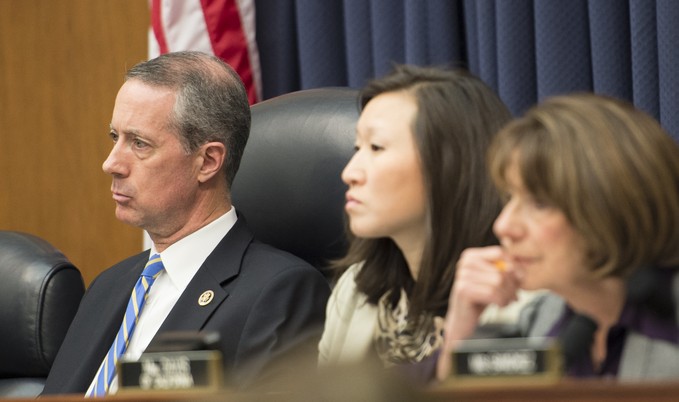 House Armed Services Committee Chair Mac Thornberry. Photo by Chairman of the Joint Chiefs of Staff via Flickr House Armed Services Committee Chair Mac Thornberry. Photo by Chairman of the Joint Chiefs of Staff via Flickr Each year, Congress passes the National Defense Authorization Act (NDAA), which authorizes the various programs and spending of the Department of Defense. This bill has not been passed yet for 2017. Rumor has it, two main issues are holding up the bill: wording that could allow discrimination based on sexual orientation and gender identity, and a desire by Majority Leader Kevin McCarthy for language to bar an bird called the sage grouse from the federal endangered species list until at least 2025.[i] It is no secret that Congress has difficulty passing bills, but the fact that a bird could hold up one of the biggest bills Congress must pass seems pretty ridiculous. Civil-military relations in the US have always been complicated. Numerous parties, including Congress, the Executive Branch, and the US Military, have a voice in national defense policymaking. Policymaking can be messy when including each of these voices, particularly when observed through the lens of Congress. In the past several decades, partisan politics and national debt have only intensified the strained relationship between Congress and the Armed Services.[ii] This strain is particularly visible in the formation of the defense budget. The NDAA is merely the first piece of the defense budget in Congress. After months of calculations and planning by the separate military forces, the Department of Defense’s (DoD) budget requests are submitted to the President, who then submits his budget to Congress. While the NDAA must pass every year, as an authorization bill, it merely authorizes the government to spend money on particular defense programs. However, lawmakers then prioritize matching the spending authorized in the NDAA when designating spending for defense through the appropriations process. Before the November 2016 election, Congress stalled the NDAA and appropriations measures, and passed continuing resolutions to fund the government through December 9, 2016. The Republican Party swept the presidential, congressional, and state-level elections, with the largest number of Republican elected officials in recent history. Right now, Congress is waiting to hear from President-elect Donald Trump on whether or not he would prefer to create his own budget for FY2017. Even if the NDAA is passed prior to the takeover of the new administration, it is unclear what President Obama will do. The current administration has threatened a veto similar to the October 2015 NDAA veto.[iii] Based simply on Congress members’ opinions, it is unclear when the appropriations bills will be dealt with: during the lame duck or after the new administration is brought in. Members such as House Majority Leader Kevin McCarthy, Senate Armed Services chairman Sen. John McCain, and several appropriations subcommittee chairmen have favored getting the appropriations bills passed sooner rather than later, in order to clear the agenda for the new administration. However, members of the freedom caucus such as Rep. Dave Brat (R-VA) prefer to wait until President Obama is no longer at the table, replaced by the new President Trump in order to maximize party control.[iv] Whether or not the Republican Party wants to burden their newly elected President with the current year’s budget, right before he starts his own draft budget for FY2018, is yet to be determined. Optimistically, the recent elections could ease the passage of defense appropriations, and perhaps the passage of appropriations as a whole in future years. However, it would be naïve to believe Congress won’t face partisan gridlock. One key aspect of defense funding in the future that remains to be seen is the relationship between House Speaker Paul Ryan and President-elect Donald Trump. Speaker Ryan had an uncertain take on Trump’s candidacy, endorsing the President-Elect and then rescinding the endorsement. However, recent signs of Speaker Ryan’s support after Donald Trump’s victory could point to a promising relationship between the two powerful men that could prevent situations such as the October 2015 veto of the NDAA. For national defense, the stopgap funding provided by delays in appropriations and continuing resolutions could have serious implications for the modernization and future readiness, capability, and force size of our military, as well. We face threats in Russia, China, Iran, North Korea, and from a variety of non-state actors, most prominently, the so-called Islamic State. Congress will need to address these issues through other mechanisms, or through additional emergency appropriations, should they worsen. [i] Insinna, V. (n.d.). Top Lawmakers Wrapping Up 2017 Defense Authorization Bill (Defense News). Retrieved November 28, 2016. [ii] Metz, S. (2015, February 13). U.S. Civil-Military Relations' Neglected Component: Congress. Retrieved November 25, 2016. [iii] Insinna, V. (n.d.). Top Lawmakers Wrapping Up 2017 Defense Authorization Bill (Defense News). Retrieved November 28, 2016. [iv] Stalled House Appropriations Awaiting Donald Trump (Defense News). Retrieved November 27, 2016.
0 Comments
Your comment will be posted after it is approved.
Leave a Reply. |
Categories
All
Archives
April 2022
|
ADDRESSVirginia Policy Review
235 McCormick Rd. Charlottesville, VA 22904 |
|
SOCIAL MEDIA |